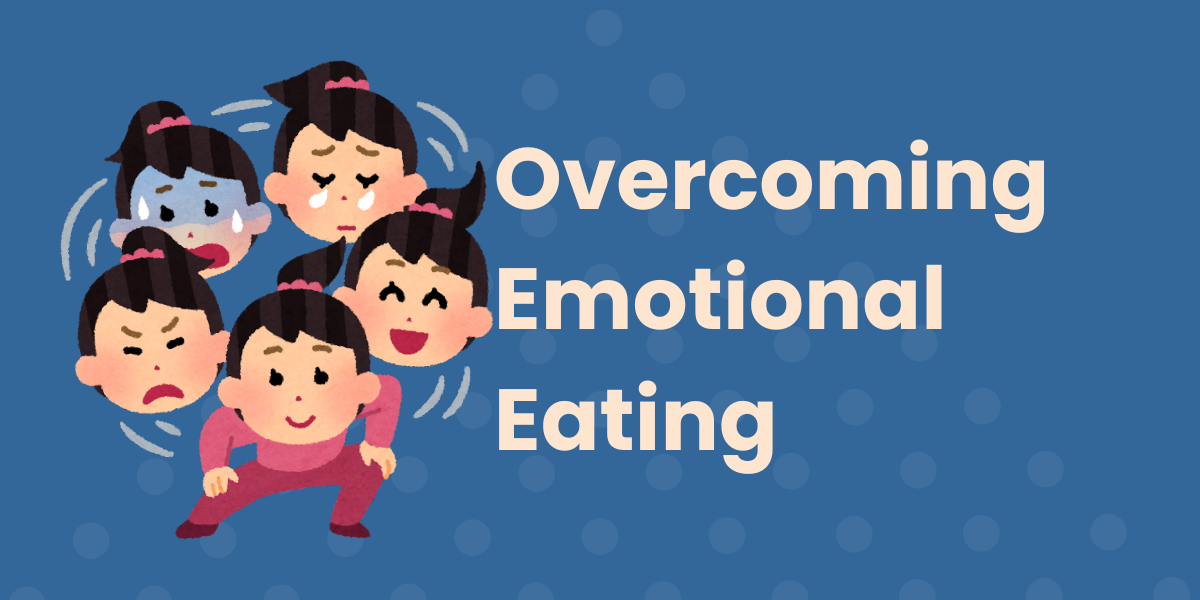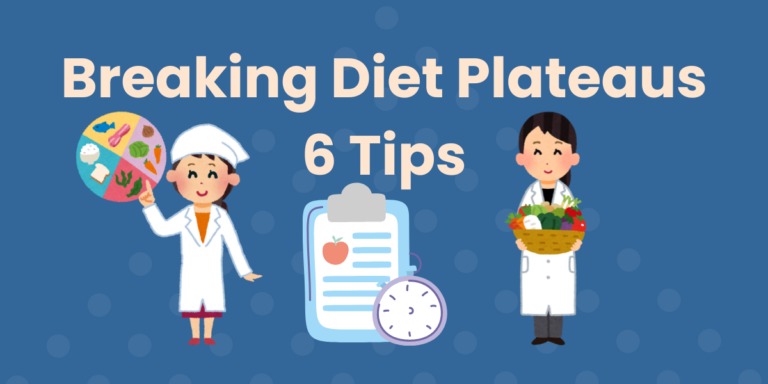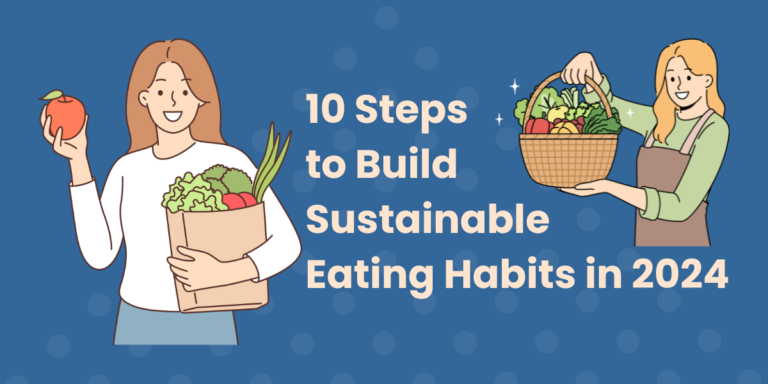Overcoming Emotional Eating: A Compassionate Journey to Self-Discovery in 2024
What does a fast food drive-thru, a pint of ice cream on the couch, a bag of chips in front of the TV, treats in the break room, and demolishing a box of cookies all have in common?
Answer: A hard day.
If it’s been a tough day, then these comfort foods provide us with emotional support. We’ve all been there. We have all felt so bad about ourselves and have had such a low mood that we crave that kick of dopamine to comfort us and soothe our soul.
Emotional eating is more common than you might think! And it appears in ways you do not expect. (anyone up for a sweet treat in the break room after being reprimanded by the boss?)
“Thirty-eight percent of adults say they have overeaten or eaten unhealthy foods in the past month because of stress.”1
You’re not alone in this struggle.
In this article, we’ll explore what emotional eating really is, why it happens, and most importantly, overcoming emotional eating with kindness and understanding.
Let’s embark on this journey together and discover a more balanced approach to food and emotions!
Understanding Emotional Eating
Understanding emotional eating is another opportunity to deepen your relationship with yourself.
There is often a negative connotation when people refer to “emotional eating”. It’s not actually a bad thing. Eating in general is an intrinsically emotional experience.
After all, we cannot enjoy our food without the emotions elicited by our sense of taste, smell, and vision. Even our sense of touch and hearing contribute enjoyable sensations (the feel of the cuisine on our tongue as we chew and the sound of the sizzle on the pan or the grill).
So let us first redefine “emotional eating” into a positive experience. Let us also recognize that both positive and negative emotions can induce eating. There are many triggers in the environment, which can elicit emotions.
The difference between physical and emotional hunger
Physical hunger is a physiological process; a highly intricate and extraordinarily refined dance which involves blood sugar levels, hormones, the hypothalamus in your brain, and your stomach.
Your brain and stomach have several means of communication. So on a very basic level, your brain tells your stomach to rumble when energy levels are low. Vice versa, your stomach tells your brain to be satisfied when full.
This system works great! However, emotions are like music. Music sets the tone, the mood, and the rhythm of the dance. Music can be erratic or harmonious which influences the movement of the couple. Music can also speed up or slow down.
Emotions can influence the dance of your physiology. For example, you can be absolutely famished, yet this somehow vanishes when you hear some unexpected news. Or you might get into an argument. Suddenly you crave your favorite comfort food.
Common emotions that lead to emotional eating
From the positive to the negative, the full spectrum of emotions can drive your hunger signals. Joy, excitement, anticipation, stress, boredom, and sadness can drive you to find temporary relief.
If we did this once in a blue moon, it wouldn’t be so much of a problem. However, we are constantly bombarded by emotionally charged content. So we may have to deal with an actual breakup from a significant other and cope with other people’s problems through various media outlets and technologies.
Temporary relief and long-term consequences of emotional eating
Therefore, the long-term consequences of consistent emotional eating wreak havoc on our general well-being and create chronic problems like diabetes, high blood pressure, and high cholesterol.
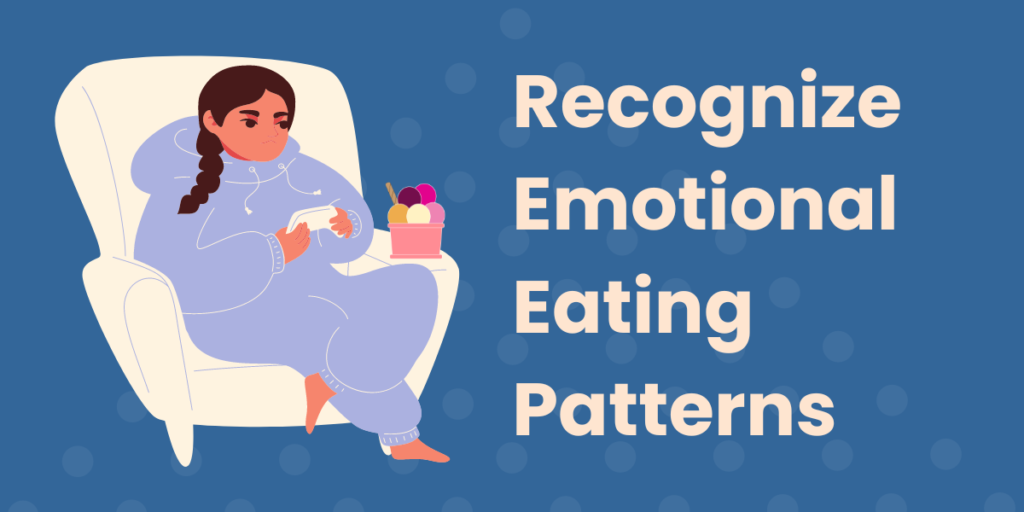
Recognizing Your Emotional Eating Patterns
Learn to identify emotional eating triggers
Recognizing your emotional eating patterns is more important than ever. So how do you learn to identify emotional eating triggers?
Many people say that you have to develop your self-awareness; and that is true. However, I’ve always had a hard time being aware during the event and only come to awareness afterwards when I regret the decision that I made. (Did I really need two hot fudge sundaes?)
Going back to basics is very beneficial. I needed to know who I am, my values, my strengths, and my weaknesses; the beginnings of developing self-awareness.
So you can start to see that self-awareness doesn’t come from trying to identify triggers from the external environment or even from within yourself. You might as well be trying to catch crazy monkeys going out of control.
In order to identify your emotional eating triggers, you need to know who you are before you can identify who you are not.
If you and I sat down and talked together, I would ask you to tell me a little bit about yourself. Tell me about your journey that brought you here. What do you hope to accomplish in our time together? How can we move forward together? How do you feel I can support you in your process?
With these questions, we can begin to shift our perspective away from identifying emotional eating as the problem. Therefore, we can focus on identifying you as an individual who is actively deepening your relationship with yourself. In turn, a richer self-relationship nourishes the growth of self-awareness.
Keep a food and mood journal to track patterns
You can keep a food and mood journal to track patterns if you want. There are many self-help tools out there that can bring you greater self-awareness and help you understand your personal emotional eating cycle.
One problem: That’s all “out there”.
Recognize the signs of using food as a coping mechanism
In order to recognize the signs of using food as a coping mechanism, you need to know your core mechanism first.
Some questions to help you tune in with yourself include (I promise this isn’t a job interview):
- What are your three greatest strengths?
- Tell me about a big challenge in your life and how you overcame it.
- What are you most proud of in your life?
- Tell me what you like about yourself.
- If there were only three rules that everyone must follow, what would they be?
- In the last week, what did you go out of your way to do?
- What does a full and rich life mean to you?
- Do you feel your thoughts get in the way sometimes?
- What holds you back?
- What do you avoid?
- Why do you believe that?
- Does it still serve you?
Developing Mindful Eating Habits
These questions help develop mindful eating habits. My understanding of mindful eating is hyper-awareness of food and your response as you eat. I’m sure this is a misconception.
Practice eating without distractions
However we can stand to do things like turn off all distractions, learn to savor and appreciate every morsel of food, and use different mindfulness techniques to tune into your body’s hunger and fullness cues. These are all correct. However, we must pay attention to our focal point.
The focus is not supposed to be on our food. It’s not even supposed to be on our awareness of personal reactions to the food. That’s still “out there”.
In order to develop mindful eating habits, we need to develop an internal awareness of how the food we eat aligns with our core values.
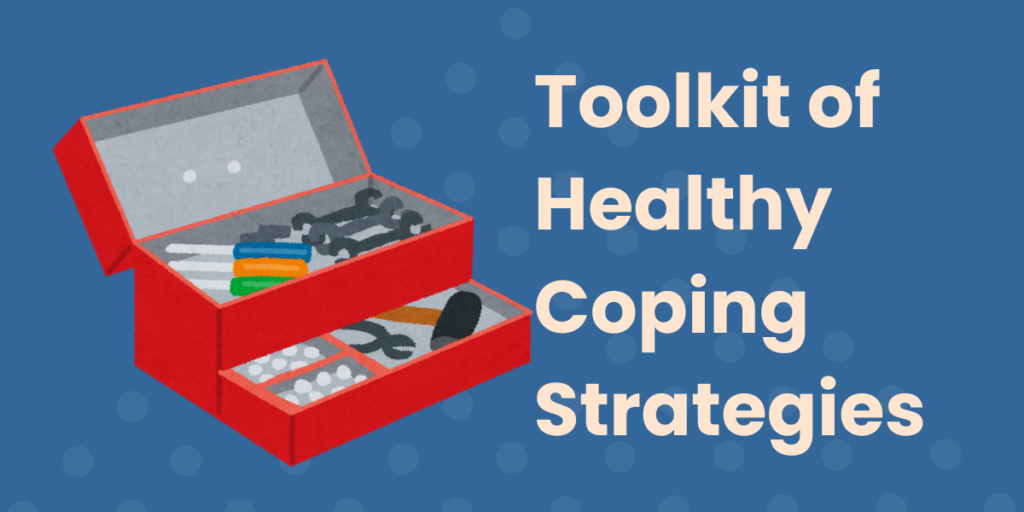
Building a Toolkit of Healthy Coping Strategies
From here, we can start building a toolkit of healthy coping strategies based on your strengths.
So what are your three strengths? How did you overcome your greatest challenge? What are you most proud of? These questions give insight into your strengths, tenacity, and convictions.
Alternative ways to manage emotions
While it’s true that you can explore alternative ways to manage emotions like exercise, meditation, or journaling, this advice presents two problems:
- It focuses on managing emotions (crazed monkeys) rather than focusing on enhancing strengths and values (grounded trees the monkeys can swing on).
- People inadvertently mismatch their strengths with the activities that they’ve been advised to do (barking up the wrong tree).
Activities for stress relief
So, what do you go out of your way to do? What drives you? What do you enjoy doing?
When you develop a list of non-food activities for stress relief, the focus cannot be on food or stress reduction. The focus must be on activities you enjoy. For example, I enjoy walking in parks.
Practice self-compassion and positive self-talk
The most important tool you have in your toolkit is the practice of self-compassion and positive self-talk.
It’s definitely okay if you fall off your path. By definition you’re not on any path because you are forging a new one for yourself. Therefore, you should expect to fall frequently.
I’ve fallen so frequently that I started to schedule my falls.
“What?! How can you schedule falling off the bandwagon? You’re crazy!”
You have a point, however when it comes to sustainable eating, allowing for “mistakes” on your terms helps improve outcomes.
Furthermore, you demonstrate self-compassion because you know you are a flawed human being and therefore you will intrinsically make mistakes in the process of growth and development.
More importantly, when you do fall off the bandwagon, you’re less likely to berate yourself and more likely to encourage yourself to keep going.
Creating a Supportive Environment
Have a look around you. The ingredients of your values helped create your environment.
What’s in your pantry and fridge, when you eat, the people you’re with, and the information you consume all reflect your core values in some way.
So let’s explore how each of these ingredients can help you create a supportive environment more aligned with who you are.
Declutter your pantry and stock up on nutritious foods
Your pantry may be filled with non-perishable items and highly processed carbohydrates. The popular advice varies between eating these items in moderation or exiling them completely.
But before we listen to anybody’s advice, let’s take a step back and consider why we chose to have these items in our kitchen.
We took the time to go to the grocery store, we spent our hard-earned money on them, and then we took the time to bring them back to our house and put them away. Why did we do all that? Because we believed that each of these items resonated with our values.
In essence, we saw a small reflection of ourselves in each item. So here is an exercise, pull out each item and ask yourself these three questions:
- What personal value does this item satisfy in my life and my family’s life?
- What does this value mean to me?
- Is there an item that does a better job of aligning with my values?
This exercise helps you to recognize that although an item may not be “healthy”, you brought it into your life for healthy reasons.
If you can identify those healthy reasons, then you can apply those reasons towards the decisions you make at the grocery store.
Establish a regular eating schedule
Even your eating schedule reflects your value system. The common schedule is breakfast, lunch, and dinner.
I bought into that schedule because it satisfies my value for reliability. Why is reliability important to me?
Because consistency helps me stay at my best throughout the day, and I enjoy having a set time to commune with colleagues, friends, and family. Therefore I decided that the schedule works.
So before you run and design a brand new schedule to control emotional eating, think about how your emotions communicate your values. What values have you neglected lately? Tend to them.
Surround yourself with supportive friends and family
The popular advice is to surround yourself with supportive friends and family. This advice is intuitive. After all, who better to support you than the people closest to you?
However, we know that the people closest to us can be our greatest skeptics; the greatest of which is ourselves. Of course, this is often done with our best intentions at heart.
So surround yourself with supportive people, but do not neglect your greatest ally.
Harness the support you need from within yourself first. Then you can begin to look outward.
Consider joining a support group or seeking professional help
Again, the internal motivation must be established first. However there were times when I needed help. Getting simple encouragement from my support system was not helpful.
In my opinion, encouragement can feel like false hope if the mood doesn’t fit. I needed people who understood my plight and had interesting perspectives and solutions.
For these reasons, I chose to study Qigong and health and wellness coaching. I met people who did more than provide encouragement. I met people who struggled with all sorts of problems that were not always similar to my own.
However I gained a sense of camaraderie because we all struggled together as human beings. That helped on the soul level.
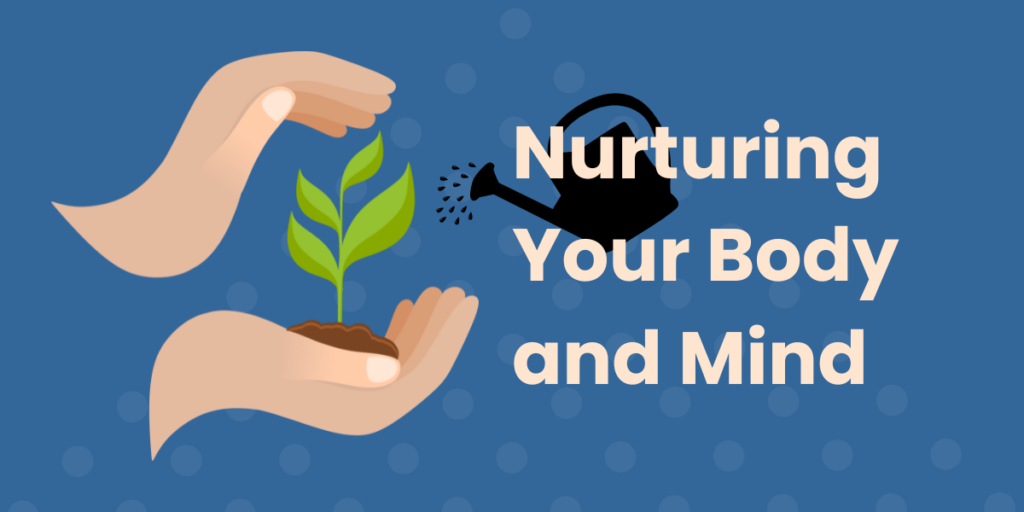
Nurturing Your Body and Mind
Emotional eating begets more emotional eating.
In order to break the cycle, you must break into a new cycle.
Nourishing your body and your mind promotes further nourishment.
The importance of balanced nutrition
The importance of balanced nutrition cannot be understated. There is a lot of scientific studies to back that up. However, I don’t need science to tell me that eating healthy makes me feel healthy.
When I feel healthy, I tend to be in a better mood. More importantly, I am able to regulate my emotions without trying.
Why is this important to me? Because emotional regulation fits my value of reliability. And why is reliability important to me? Because I want to be reliable for my colleagues, friends, and family. Reliability is fundamental to my relationships.
Therefore I eat in a way to support healthy relationships towards others and for myself.
The role of regular exercise in emotional well-being
Again, loads of scientific studies demonstrate the benefits of exercise for mental health. These studies just find new ways to confirm what we intuitively know.
Regular exercise improves my mood and emotional regulation; which is important to support personal reliability; which is important to support healthy relationships to others and myself.
The benefits of adequate sleep and stress management
Sleep is like water to me. If I don’t get enough, my mood tanks. Then the domino effect begins again.
Have you noticed the same effect? Without a good night of sleep, you simply cannot be at your best for your family or for yourself. Ironically, they might be the reason you can’t get a good night’s sleep! So what do you do?
- Acknowledge your desire to follow through on your good intentions.
- Recognize that things are not always in your control.
- Appreciate the frustration and disbelief that this is an issue.
- Consider what you want to do; for example, “I just want to go to bed on time without feeling stressed about things I have to do.”
- Recognize that you are hard-working and want to feel accomplished.
- Then ask yourself, “When was a time that you felt the most accomplished?”
- Write about that time: What did it look like? How did you feel? Were you stressed or satisfied? Did you sleep well at that time? What can you do today to bring that person back?
Remember one thing: the problem is never the problem; it’s a complication of the real problem. In this case, the problem of an unsatisfied value system despite working hard and getting nowhere.
So consider why you would want to focus on adequate sleep and stress management.
Encourage self-care practices and setting boundaries
In answering the questions above, you may naturally realize the self-care practices you lost over time.
Again, the problem is not the problem. However you can glean the underlying issue by asking yourself what you want and recognizing the strengths and values behind your answer.
“I wish I could take time off work without worrying about how I’m going to pay the bills.”
This person may value independence, time with family, learning, power, relaxation, self-awareness, or any number of things.
“Self-care” and “setting boundaries” have become buzz words. While they are important, looking beneath the surface is of greater importance.
Why do you value them? What do they mean to you?
Find the value of the thing you want to achieve, and you will find the meaning.
Embracing Progress, Not Perfection
Tell me what success looks like to you. How will you know when you arrive? Do you need to arrive in order to feel successful?
What is success if not a continuous process of trial and error?
Set realistic goals for overcoming emotional eating
First, base your goals on your values. Otherwise, your goal might as well be to enjoy the food you eat emotionally!
Next, consider small changes you can make to further align with your values.
Hint: The small changes you think of may have nothing to do with food or eating. So keep an open mind to the ideas your mind creates.
Learn to view setbacks as learning opportunities
Setbacks build character. Why do they do that?
Because setbacks help us develop an understanding of what’s important in life. When we understand what’s important, we begin to understand our values.
Values in themselves do not build the character; it is the process of furthering self-knowledge that builds character.
Emotional eating is a struggle that helps further self-knowledge and ultimately build character.
So feel free to fail and face setbacks as many times as possible. Just remember you are learning a little more about what makes you who you are.
Believe me, you are not an emotional eater. You are a human being.
Celebrate small victories and progress
What is a victory?
A victory brings you into greater alignment with your values.
Celebrate victories, big or small, because you are worth celebrating. More importantly, you are worth exploring, discovering, and fighting for.
Develop a long-term mindset for sustainable change
Developing a long-term mindset is crucial for sustainable change when it comes to overcoming emotional eating. This isn’t about quick fixes or temporary diets. You have a lifelong journey of self-discovery and growth.
Remember, your relationship with food is just one aspect of your overall well-being. As you work on understanding your values and aligning your actions with them, you’ll naturally develop healthier eating habits. This process takes time, patience, and self-compassion.
Consider these points for developing a long-term mindset:
- Focus on progress, not perfection: Every small step towards your goals is a victory.
- Embrace the journey: Learn to enjoy the process of self-discovery and growth.
- Be flexible: Life changes, and so can your strategies. Be open to adapting your approach as needed.
- Practice consistency: Small, consistent actions over time lead to significant changes.
- Keep learning: Stay curious about yourself and continue to explore new ways to nurture your body and mind.
Remember, overcoming emotional eating isn’t just about changing your relationship with food—it’s about deepening your relationship with yourself.
By maintaining a long-term perspective, you’ll be better equipped to handle setbacks, celebrate progress, and create lasting, meaningful change in your life.
Conclusion
Overcoming emotional eating is indeed a journey, not a destination. By understanding your triggers, developing mindful habits, and nurturing your body and mind, you’re taking powerful steps towards a healthier relationship with food. But more importantly, you’re embarking on a path of self-discovery and personal growth.
Remember, it’s okay to have ups and downs – what matters is your commitment to understanding yourself better and aligning your actions with your values. Be patient with yourself and celebrate every small victory. Each step forward, no matter how small, is progress.
As you move forward, keep in mind that this journey is about more than just food. It’s about understanding your emotions, recognizing your values, and nurturing a compassionate relationship with yourself. You’re not just overcoming emotional eating; you’re learning to live a more authentic, fulfilling life.
Why not start by trying one of the strategies we’ve discussed today? Perhaps you could begin by asking yourself those self-reflective questions, or by examining the items in your pantry through the lens of your personal values. Your future self will thank you for taking this first step towards a more balanced and joyful life.
Remember, you are not defined by your eating habits. You are a complex, valuable human being on a journey of growth and self-discovery. Embrace this journey with open arms, and trust in your ability to create positive change in your life.
You’ve got this! And remember, every step forward, no matter how small, is a victory worth celebrating. Here’s to your journey of self-discovery and a healthier, more balanced relationship with food and yourself!
References
- American Psychological Association. (2013). Stress and Eating. American Psychological Association. https://www.apa.org/news/press/releases/stress/2013/eating

